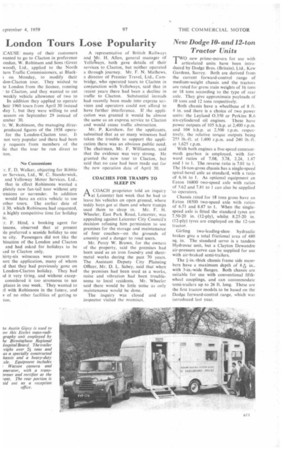London Tours Lose Popularity
Page 45

If you've noticed an error in this article please click here to report it so we can fix it.
CAUSE" many of their customers wanted to go to Clacton in preference ondon. W. Robinson and Sons (Great wood), Ltd., applied to the North tern Traffic Commissioners, at Black on Monday, to modify their don-Clacton tour. They wished to te London from the licence, running to Clacton, and they wanted to cut weekly vehicle allowance of two to In addition they applied to operate heir 1960 tours from April 30 instead day I, but they were willing to end season on September 29 instead of ember 30.
fr. W. Robinson, the managing direcproduced figures of the 1958 operafor the London-Clacton tour. It not very popular and there had been y requests from members of the lie that the tour be run direct to :ton_ No Concessions r. F. D. Walker, objecting for Ribble or Services, Ltd., W. C. Standerwick, and Yelloway Motor Services. Ltd.. that in effect Robinsons wanted a pletely new fan-tail tour without any :essions or surrender. In addition would have an extra vehicle to use other tours. The earlier date of 30, which Robinsons had requested, a highly competitive time for holiday ic.
r. F. Hind, a booking agent for insons, observed that at present le preferred a seaside holiday to one le city. Passengers did not like the bination of the London and Clacton and had asked for holidays to be ced to Clacton only.
airty-six witnesses were present to ion the application, many of whom :ci that they had previously gone on London-Clacton holiday. They had id it very tiring, and without excepconsidered it too strenuous to see places in one week. They wanted to with Robinsons in the future, and v of no other facilities of getting to ton. A representative of British Railways and Mr. H. Allen, general manager of Yellolways, both gave details of their services to Clacton, but neither operated a through journey. Mr. F. N. Mathews, a director of Premier Travel, Ltd., Cambridge, who operated tours to Clacton in conjunction with Yellotways, said that in recent years there had been a decline in traffic to Clacton. Substantial inroads had recently been made into express services and operators could not afford to have further interference. If the application was granted it would be almost the same as an express service to Clacton and would cause traffic abstraction.
Mr. P. Kershaw, for the applicants, submitted that as so many witnesses had taken the trouble to support the application there was an obvious public need. The chairman, Mr. F. Williamson, said that the evidence was very strong. He granted the new tour to Clacton, but said that no case had been made out for the new operation date of April 30.




















































































































